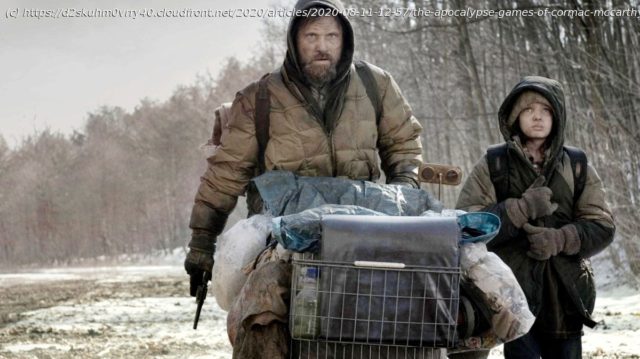What videogames have learned from a deeply pessimistic vision of America.
Games abound in the novels of Cormac McCarthy, though it might take you a while …
What videogames have learned from a deeply pessimistic vision of America. Games abound in the novels of Cormac McCarthy, though it might take you a while to notice them. Partly this is because they’re small: tossed coins and chess pawns in the shadow of landscapes that stretch forever, the big skies of America bearing down remorselessly on casts of lost cowboys, hardy drifters and philosophical killers. And partly, it’s because the games are enormous, almost too large to see. They loom within the mesas and canyons of McCarthy’s prose like krakens mistaken for the ocean floor. Consider The Road, the Pulitzer-winning tale of a nameless father and son, journeying toward the coast of an America reduced to ash and bone. It’s a grinding descent of a book, weeks of shuffling despair scattered with violence like drops of blood in brackish water. Perhaps McCarthy’s best-known work today, its vision of climate disaster has shaped the rise of a remarkably despondent breed of post-apocalyptic video game – neurotically focused on tiny acts of subsistence, rather than the neo-barbarian excess of games like Rage 2. The Road isn’t all gloom, however: it also harbours glimmers of playfulness. Games of quoits with scavenged steel washers. A round of checkers by candlelight. There are card games, too: Old Maid and Whist, played with a deck missing the Two of Clubs, together with sillier games of the father’s devising, like “Abnormal Fescue”. Cards, here, are more than cards, much as characters are more than people: all are symbols in McCarthy’s torrid mythology of America. The missing Two of Clubs reflects the isolation of the protagonists, who in turn resemble a final hand in a card game aeons in the playing. The cards are also a mechanism of time travel, a way of conjuring a bygone world for a child born after the collapse and a man unable to think outside the exhausted present. These wistful reminders are a distraction from the practicalities of survival, but they are necessary, the book suggests, if those practicalities are to have any meaning or momentum. They are “orders in creation”, in the words of Blood Meridian’s judge Holden – “put there, like a string in a maze” to give shape to an indifferent universe. Set in the mid-19th century and generally regarded as McCarthy’s best book, Blood Meridian hasn’t captured the imaginations of game developers like The Road, but its spectre haunts the latter’s apocalypse and is vital to an understanding of its games. In Holden’s estimation, “men are born for games”, war being “the ultimate game because war is at last a forcing of the unity of existence”, fixing players symmetrically as victors or the slain. This creed animates a country-wide spree of murder, rape and mutilation over which the “vast abhorrence of the judge” presides as chronicler and enabler. Where The Road scours the wreckage of the United States, Blood Meridian excavates its birth in the shambles of the borderlands, those usefully “lawless” regions beloved of open world shooters. It’s a vicious debunking of Wild Western cliches, as violently coloured as The Road’s devoured and devouring America is pitilessly grey. To speak of beginnings and endings is to miss something crucial, however. The Road and Blood Meridian mirror rather than following one other, each dominated by a journey and hinging on the tension between old and young men: Blood Meridian pits the judge against the Kid, who falls in with Holden’s gang of scalp-hunters after an ill-fated expedition to Mexico. The trick to these mirrorings is that Blood Meridian, too, is a post-apocalyptic story, because in McCarthy’s eye, the United States has always been a post-apocalyptic land, born of genocide and dispossession. The source of The Road’s Earth-killing catastrophe is never given, which lends the disaster an open-endedness that loops back to the atrocities of America’s settlement. Time, in each book, hovers on the edge of meaninglessness. As the father remarks to himself, “there is no later” because everything reverts to the same “common provenance in pain”. The judge, meanwhile, styles existence “a trance” with “neither analogue nor precedent”, in which everything is possible and not even the blood-soaked past can be taken for granted. As he asks the Kid: “where is yesterday?” Rather than distinctions in time, this account of history is made coherent by adversarial rituals that reflect a fundamental inhumanity – combat, conquest, the playing of games. McCarthy’s tendency to portray violence as just elementary stage machinery in the cycling horrorshow of reality invites translation into the language of big budget action games. Blood Meridian’s litany of killings is echoed by the endless, perfunctory slaughter of Red Dead Redemption 2, which riffs on the novel to the point of having journal entries written in passable McCarthyese. The Road’s campfire games suggest a brighter outlook, but they orbit a larger game of narrative archetypes, invented by the father, which is every bit as brutally reductive as Holden’s warmongering: “good guys”, “bad guys” and a child who becomes a precious object out of scripture – a quest item, “glowing like a tabernacle”. This larger, unspoken game gives the pair rules to live by, but it also reflects an inability to make anything of a universe that isn’t as cold and spent as it seems. The book begins with the father waking from nightmares of a creature with “eyes dead white and sightless as the eggs of spiders” and sweeping his binoculars over a “barren, silent, Godless” countryside. The desolation might seem an indisputable fact, but it’s not clear the father is capable of seeing anything else. Paralysed by loss, he has become the co-architect of a reality shrunk to a “raw core of parsible entities” – food, water, shelter, firewood, bandits and bullets. As a means of constraining the landscape’s possibilities, this framing evokes both the open world protagonist tagging objects through a spyglass and the imperial anxieties of Holden, who is forever annotating and categorising his surroundings in a bid to become “suzerain of the Earth”. It’s left to the boy, inevitably, to seek out the future his father cannot see. We never quite meet with that future in the book, which suggests a writer conceding the limits of his own imagination. McCarthy’s handful of magazine profiles reveal him for an incorrigible hermit and pessimist: he has argued that the notion of progress is a sham, that humans are inherently violent, that “living in harmony” means “giving up your soul, your freedom”.






